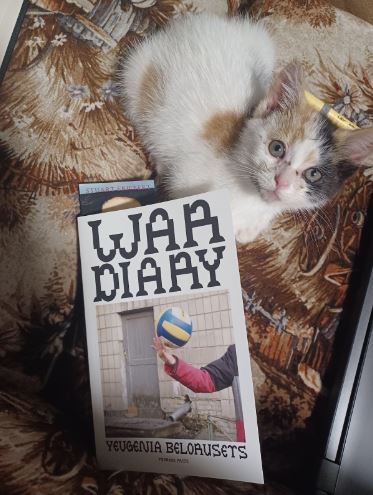by Nicole Yurcaba

It seems everyone’s keeping a diary these days. At least, everyone – and particularly every major writer – in Ukraine is. A few are even publishing their diaries, and these personal accounts should be compulsory reading for anyone who continues wondering why global support for Ukraine is necessary and should remain ongoing. In May 2023, Yale University Press published Serhiy Zhadan’s Sky Above Kharkiv: Dispatches from the Ukrainian Front. Earlier, in April 2023, Deep Vellum released Andrey Kurkov’s Diary of an Invasion. Sneaking its way onto the literary stage, however, was another important diary–Yevgenia Belorusets’ War Diary, published by Pushkin Press in April 2023. An artist and writer, Yevgenia Belorusets was in Kyiv, her hometown, when Russia launched its full-scale invasion on 24 February 2022. The entries in Belorusets’ diary were originally published daily by Germany’s Der Spiegel and quickly gained attention and acclaim, and like Zhadan’s Sky Above Kharkiv, Belorusets’ entries capture Ukrainians’ collective struggle to create normalcy amid war.
For readers new to the war or shocked by the fact that the largest full-scale invasion on European soil since World War II has happened in the 21st century, Belorusets’ entries make one concept very clear–the war began in 2014, and the world ignored it. In the preface, Belorusets suggests that when the war began in 2014, it was “still a child, so fresh that it introduced itself to the world without its own date of birth.” She also poses an idea that might truly capture the sentiment held by global governments who still fail to recognize the current full-scale invasion’s origins: “If the war seemed like it might disappear of its own accord, perhaps that was only because it wasn’t recognized as war.” A March 2023 article in The Conversation suggests that the world’s ignorance of the 2014 Crimea Referendum simply paved the way for Russia’s 2022 invasion. Russia had used the same rhetoric for annexing Crimea that it used to justify its 2008 invasion of Georgia. Thus, when Belorusets posits that within the war exists a “strange calculation, which obeys no clear logic, that devalues everyday life to the point of negation,” her comments not only resonate with the events of February 2022 and onward, but also the other military operations which Russia has initiated.
Belorusets’ War Diary also challenges readers, and global leaders, to remember that the ideals for which Ukrainians fight are “values much bigger than Ukraine that need to be defended.” One would think the Ukrainian fight for sovereignty and democracy would resonate with Americans in particular. However, a small yet vocal group of alt-right Republicans oppose sending more aid to Ukraine, and representatives like Marjorie Taylor Greene continually portray Ukrainians and the Ukrainian military as Nazis. Belorusets is diplomatic, in that she refrains from identifying and naming specific governments and individuals who oppose Ukraine and are inherently pro-Russian. Instead, she maintains an elegance which most anyone can envy: “There are situations where resistance means salvation. And it is not about self-help–it is about rescuing ourselves from a much greater violence, from a much more terrible war. I hope that every day more people understand this, wake up, and put an end to this violence.” As the book continues, so do Belorusets’ insights about the global community’s response to the war. She asks, “How can the world put an end to this crime?” She explains, “This is not just a war but a continuous terrorist attack,” and she acknowledges that the violence and terrorism which the Russians inflict on Ukrainians is not only meant to intimidate Ukrainians, “but also to terrify the whole world.” With these observations, Belorusets gently prods the global audience to remember that every day is about choices, about standing with the oppressed or the oppressor, and everyday one must encounter the consequences of those choices.
Belorusets also illuminates another powerful narrative the Russians have pushed across the globe using a unique tool that allows them to widen their propaganda’s audience–the internet. “Russia publishes manifestos in the state media to justify the mass murder of every one of us,” she writes. She also touches on a very uncomfortable point for global policymakers–how a lack of response to Russia’s atrocities has “indirectly legitimized” mass murders because the world pauses and “considers what to do next.” One can also carefully consider Belorusets’ observations in the context of the 2023 NATO Summit in which UK and US leaders accused Ukrainians of being ungrateful for what support the two allies have offered. The criticism emerged after Ukrainian president Volodymyr Zelenskyy blasted NATO for not offering Ukraine a firm timeline for joining NATO. These parallels between diary entries written over a year ago and the continued political and economic kowtowing of various nations to Russia transform War Diary from being a simple series of personal reflections into a socio-political commentary in which everyday Ukrainians, rather than governmental figureheads, have the opportunity to show the world what Ukraine and Ukrainians truly need.
Today, 24 August, is Ukraine’s Independence Day. As Ukrainians have demonstrated for 18 months now, they will do everything in their power to protect their freedoms and a free Ukraine. Perhaps, then, next to Taras Shevchenko’s Kobzar, there is no more appropriate book to read today than Yevgenia Belorusets’ War Diary, because for anyone who values freedom, democracy, and human rights, Ukraine’s continued battle to protects its sovereignty is inherently a fight for all.
Nicole Yurcaba (Ukrainian: Нікола Юрцаба–Nikola Yurtsaba) is a Ukrainian (Hutsul/Lemko) American poet and essayist. Her poems and essays have appeared in The Atlanta Review, The Lindenwood Review, Whiskey Island, Raven Chronicles, West Trade Review, Appalachian Heritage, North of Oxford, and many other online and print journals. Nicole teaches poetry workshops for Southern New Hampshire University and is a guest book reviewer for Sage Cigarettes, Tupelo Quarterly, Colorado Review, and The Southern Review of Books.



Add your first comment to this post